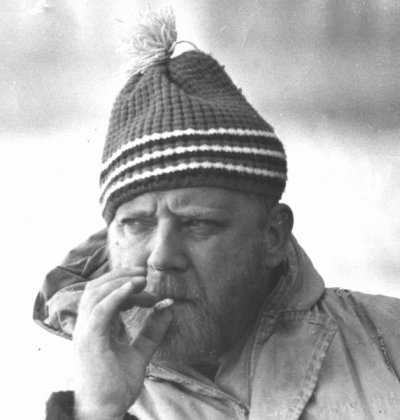| B i o g r a p h y |
 Yuri Vizbor (Юрий Иосифович Визбор) (June 20, 1934–September 17, 1984) was a well-known Russian bard and poet as well as a theatre and film actor.
Yuri Vizbor (Юрий Иосифович Визбор) (June 20, 1934–September 17, 1984) was a well-known Russian bard and poet as well as a theatre and film actor.
Yuri Vizbor was born in Moscow where he lived for most of his life. He worked as a teacher, a soldier, a sailor, a radio and press correspondent, a ski instructor, and an actor in many famous Russian films and plays. He participated in and documented expeditions to remote areas of the Soviet Union. His compositions included songs, poetic prose, plays, screenplays and short stories.
Vizbor's father was a commander in the Red Army of Lithuanian descent. His family name was originally Vizbaras. His mother was an ethnic Russian from Krasnodar. In 1937 his father fell victim to Stalin's purges and in 1941 he moved with his mother to Siberia. This period influenced the artist's distaste for politics and his fascination with wilderness. In 1951, he graduated from high school and was accepted at the Moscow State Pedagogical Institute. It was here that he wrote his first song, entitled "Madagascar".
After graduating with a degree in Russian Language and Literature in 1955, Vizbor worked as a teacher in Arkhangelsk. In 1957 he joined the Army where he worked as a radio operator. He was married in 1958. In the late fifties and early 60's Vizbor began to acquire notoriety as a songwriter by circulating home made tapes.
Vizbor is often compared with his contemporaries, Vladimir Vysotsky and Bulat Okudzhava. The topics of Vizbor's songs were observational, focusing on his love of nature and of travel. By using his extremely varied professions as a template, Vizbor attempted to document various aspects of "normal life" at the height of Brezhnev's period of stagnation. His trademark was a relaxed singing style that often sounded on the verge of laughter. Vizbor would record songs with a traditional Russian seven-string guitar that was often slightly out of tune. While most Russian Bards relied on a rhythmic strumming pattern as the basis for their musical accompaniment, Vizbor was fond of a slow plucking style epitomized by songs such as "Fanskie Gory". His best-known tune was a romantic ballad called "Solnishko Lesnoe" or "Forest Sun." On a more somber note, his song "Seryoga Sanin" told the story of a free spirited friend who dies tragically.
Vizbor composed at a time when the censorship laws were still in place yet were not as vigilantly enforced as in the past. Vizbor's songs and writings rarely had overt political content. His style could more accurately be described as anti-political.
In March of 1984, Vizbor wrote his last song, having written over 250 of them during the past thirty-three years. (In addition, many other musicians have put his poetry to music.) His last writings were letters to his daughter from his sickbed while he lay dying of liver cancer from April to September of 1984.